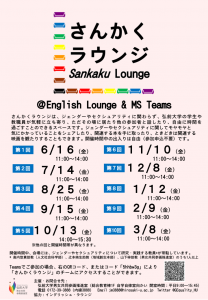
Oct 05
EL本棚Column: Thoughts on choosing an Extensive Reading Book
(日本語はこちらです)
When I was a student, I studied Japanese in a variety of ways. For as long as I have studied Japanese, however, I have consistently done what we call Extensive Reading (多読). Therefore, in this blog post I want to offer some thoughts about choosing books for reading in a second language, based on both my personal perspective and some research in the field of language pedagogy.
The most important thing is finding books that you will continue reading.
Research on Extensive Reading consistently emphasizes both the role of enjoyment in reading and ease of comprehension. When teachers recommend books for extensive reading, however, we often point to “Graded Readers” and over-emphasize difficulty and ease of reading. Graded Readers are the books in the English Lounge and library with numbers on the cover telling you how challenging they are (in length, vocabulary, sentence complexity, etc.). The general rule is that you should be able to read Extensive Reading quickly and easily, understanding about 80-90% without a dictionary. Graded Readers make finding books like that comparatively simple.
That said, Graded Readers are not “authentic texts”; they are not written for native speakers. In fact, many are famous stories and classic literature that have been rewritten in a much simpler way.
How do you feel about that? While I never had Graded Readers when studying Japanese, I do recall two instances of using simplified texts in my classroom (Soseki’s Botchan and Ogai’s “Takasebune”). To be honest, when I later learned that these were simplified versions of the stories, I felt betrayed, like I had been lied to. I wanted to read the “real thing.” So, my personal feelings are that Graded Readers would not work for me. Instead, I used to read a lot on the internet using Aozora Bunko. The advantage of reading online was that I could copy and paste kanji into an online dictionary quickly and easily.
Many of my classmates used manga to practice reading Japanese, and many international students do the same today. In my case, when I first came to Japan, I knew that I would mostly be drawn to manga with very difficult language—for example, Romance of the Three Kingdoms—and so I did not choose to read any. The first manga that I read at length was Mushishi, which also had very difficult language. However, I read it because I had watched the anime and was already familiar with most of the episodes’ contents. This meant I was “learning what I already know.” I often recommend choosing something to read that is more challenging if you already know about it—something you have read in Japanese, seen the movie, a subject you studied in school, etc.
The last point I want to bring up is how to bridge between Graded Readers and novels. If you want to try reading authentic texts but cannot find a book you “already know,” I suggest looking at “children’s literature.” A number of books in the English Lounge library are “children’s literature,” although I actively avoid using that term on this blog. The reason for this is that I wouldn’t want to read a book if you told me it was for children, and I doubt you would either. Yet, think about the complexity of the language that you, as a native Japanese speaker, were reading in middle and even elementary school. You would be surprised at how difficult some of the language in English “children’s literature” can be.
You can also expect these books to be worthwhile: the English Lounge keeps books that give you the opportunity to think about interesting themes, meet interesting characters, read interesting plots, or at least enjoy some humor or action. Put another way, while many people would say that Miyazawa Kenji wrote “children’s literature,” many would also agree that his works are just as interesting for adults to read. So, in a word, do not be scared off if you think a book is intended for children. I make a point of reading as much of the English Lounge library as I can, and I have yet to find a book that I thought had no value for you as a college student (and if I did, I would get rid of it!)
To repeat the main point: Extensive Reading only works if you read a lot, and that means you have to feel like reading more and more. In this blog post, I wrote about Graded Readers, learning what you already know, and children’s literature as authentic texts. Know yourself and how you feel—maybe a newspaper or a science textbook will work better for you. These are just some thoughts to help you start thinking about your learning process.
Jul 27
EL本棚紹介(80) Animal Farm, by George Orwell
[Welcome to the EL Book Introductions series. These posts are all short (<180 words) introductions/reviews of books in the EL library. They focus on telling you what we think will be interesting for you, a college student and English learner, so use them to help you find the right book for you. You can also use the tags to find books about topics you might be interested in.]
_______
George Orwell’s most famous novel, 1984, is a masterpiece of modern fiction. It is a fictional story examining how a fascist society operates. The setting is a drab but realistic world in which individuality is stamped out by an oppressive government. It was also made into a pretty good movie (see the trailer here: https://www.imdb.com/video/vi2065472025/?playlistId=tt0087803&ref_=tt_ov_vi).
Animal Farm is a novella—only about 100 pages—and tells the story of a group of animals who rebel against the farmer and drive the humans from their farm. They create a new society with rules to keep everyone equal and happy. But the good times do not last, as the pigs rise to power, rewrite the history of Animal Farm, and open up relations with the men in the town.
Animal Farm sounds like a fairy tale, but it is really a political critique, like 1984. In this book, Orwell is critiquing the Soviet Union. As the introduction explains, Orwell was a leftist, but he also could not ignore the atrocities and failures of the Soviet government. The fact that he translates this critique into what almost seems like a children’s story is what makes Animal Farm so unique.
My two cents: This is certainly a challenging book, but I think if you are interested in history or politics that it well worth your time.

Jul 27
EL本棚紹介(79) Stitches: A Memoir, by David Small
[Welcome to the EL Book Introductions series. These posts are all short (<180 words) introductions/reviews of books in the EL library. They focus on telling you what we think will be interesting for you, a college student and English learner, so use them to help you find the right book for you. You can also use the tags to find books about topics you might be interested in.]
_______
One of the reasons why comic books and graphic novels have become popular in the United States recently is that they are a creative “medium.” Instead of writing only with words, artists combine words and pictures to show how they feel. When the boy in Stitches feels lonely and retreats into his drawing, he literally falls into his coloring book. When adults are angry and difficult to understand, they start looking a little less human, and more like monsters.
Stitches is an autobiographical story by David Small. He writes about a horrible experience he had growing up in 1950s America surrounded by homophobia (anti-LGBTQ hate), angry parents, and a life-threatening disease: cancer. David’s story is a sad one, and he suffers neglect from both of his parents, who hide both his cancer from him and the terrible reason he got it. It’s a mystery, it’s a little weird, and it’s strangely beautiful.
My two cents: I read this book in one sitting. It’s not a happy, “fun” story, but it really captured me.

Jul 21
EL本棚紹介(78) The Tempest: The Graphic Novel, by William Shakespeare, adapted by John McDonald
[Welcome to the EL Book Introductions series. These posts are all short (<180 words) introductions/reviews of books in the EL library. They focus on telling you what we think will be interesting for you, a college student and English learner, so use them to help you find the right book for you. You can also use the tags to find books about topics you might be interested in.]
_______
The Tempest is the last play that Shakespeare wrote by himself. If you have never read Shakespeare or never seen a movie or play by him, you will probably be surprised by this book. The story is full of magic, fairies, and monsters. There is fighting and humor and a little bit of mystery. Everything happens when a great tempest (storm) forces a king, his son, and their comrades onto a mysterious and magical island. The wizard Prospero lives there, and causes all sorts of chaos for the king and his men. However, when you learn about the wizard’s past, you may come to understand his point of view.
Unlike the Shakespeare manga series, this book uses mostly easy to understand modern English. The art is decent, and the whole book is in full color. Because Shakespeare wrote plays, they fit very well with the visual medium of the comic book. Also, as this series is published by an English education company, there is a vocabulary list and interesting information about Shakespeare and the play in the back of the book.
My two cents: I found myself wanting to know more about Caliban’s story as I read. Caliban looks like a monster, but I think you will feel sorry for him and how he is treated.
Jun 15
Sankaku Lounge 16.06.2023 11.00-14.00
当室では、今年度より下記のとおり「さんかくラウンジ」を開催いたします。
さんかくラウンジとは、ジェンダーやセクシュアリティに関わらず、弘前大学の学生や教職員が気軽に立ち寄り、ただその場に居たり他の参加者と話したり、自由に時間を過ごすことのできるスペースです。ジェンダーやセクシュアリティに関してモヤモヤと気にかかっていることをシェアしたり、関連する本を手に取ったり、ときどきは関連する映画を観たりすることもできます。開催時間中の出入りは自由(参加申込不要)です。
第1回は6月16日(金)、その後も7月から来年3月まで毎月開催予定です。
会場、Teamsの両方により開催します。
多くの皆様のご参加をお待ちしております。
| 日 時 | 6月16日(金) 11:00~14:00 (開催時間中の出入りは自由です) |
|---|---|
| 会 場 | 総合教育棟2階 イングリッシュラウンジ および Microsoft Teams |
| 参 加 費 | 無料 |
| 対 象 | 本学の教職員・学生 |
| 参加方法 | 事前の参加お申込は不要です。 会場にいらっしゃる方は、開催時間中いつでもお気軽にお立ち寄りください。 Teamsで参加される方は下記リンクもしくは「コードでチームに参加する」から「5hhbw3g」を入力してご参加ください。 さんかくラウンジのチームはこちら |
| 協 力 | イングリッシュ・ラウンジ |
| 連絡先・ 問い合わせ先 |
弘前大学 男女共同参画推進室 TEL: 0172-39-3888/FAX:0172-39-3889 Email:equality[a]hirosaki-u.ac.jp ※[a]を@に置き換えてください。 |

May 30
EL本棚紹介(77) Frankenstein: The Graphic Novel, by Mary Shelley, adapted by Brigit Viney
[Welcome to the EL Book Introductions series. These posts are all short (<180 words) introductions/reviews of books in the EL library. They focus on telling you what we think will be interesting for you, a college student and English learner, so use them to help you find the right book for you. You can also use the tags to find books about topics you might be interested in.]
_______
Frankenstein is one of the classics of horror literature, and it is also widely recognized as the first science fiction (SF) novel ever. It has been made into many movies, including the classic comedy retelling Young Frankenstein (https://www.imdb.com/title/tt0072431/?ref_=nv_sr_srsg_0). It tells the story of the scientist Victor Frankenstein and the “monster” he creates by sewing together dead bodies. He brings the monster to life, only to find his family hunted down and murdered by it over the next several years.
Frankenstein is a wonderful book, and I think you will be surprised by how the author treats the “monster.” Lucky for you, by translating it into a comic book, Viney has made the lengthy original story much more accessible. This adaptation is only about 130 pages. In addition, the pictures tell the story as much as the words do. Because this book was produced by an English textbook company, there is a list of vocabulary words in the back with some interesting information about the author.
My two cents: While this book does not have the best art of the books in our collection, it is still of good quality and supports the story well.

May 30
EL本棚紹介(76) Demon Slayer Volume 1, by Koyoharu Gotouge
[Welcome to the EL Book Introductions series. These posts are all short (<180 words) introductions/reviews of books in the EL library. They focus on telling you what we think will be interesting for you, a college student and English learner, so use them to help you find the right book for you. You can also use the tags to find books about topics you might be interested in.]
_______
This is a book that needs no introduction. If you like Demon Slayer (Kimetsu no Yaiba) in Japanese, you will like it in English. If you don’t like it in Japanese, then you won’t like it in English.
This is a good example of what I mean when I write that “it’s easier to learn what you already know.” If you have already read Demon Slayer in Japanese or watched the anime, then you will know what to expect when reading in English. This lowers the “cognitive load” (how much work your brain needs to do) when reading, because you will already know the characters’ names, you will understand about the world (full of demons and demon slayers), and you might even remember what will happen in the story. As a result, you will be able to guess the meaning of words you don’t know more easily, and you can probably even skip difficult sections without getting confused about the story. I suggest trying to “learn what you already know” by reading some manga or even something in your major (like science or history) that you know well in Japanese. It is a good way to improve your reading skills.
My two cents: I have only read the first volume, so I am curious how the story develops. That said, I don’t really care for the art style…

May 15
EL Game Theories (02): Game Types for English Learners
[Welcome to the EL game series. These posts are all short introductions to games you can play in the EL. Because learning to play games in English can take a long time, some posts will explain how to play simple versions of games. Other posts tell you why you should use games to practice English. You can also use the tags to find other posts you might be interested in.]
_______
When you choose a game in English, try to pick the right kind of game for you. Here are some ways to think of game types:
Word games (1) – Some games, like Scrabble, are all about YOU making lots of words yourself. This is difficult for native speakers, so I do NOT recommend playing with the official rules.
Word games (2) – Some games, like Apples to Apples and Last Word, have lots of cards with lots of words on them. Native speakers know all of the words, and the game for them is about being creative and tricky with their definitions. YOU should use these games to learn new words. I recommend playing with a dictionary, and sharing what you learn with everyone in the group.
Simple card games – Simple card games, like Uno and Sushi Go!, can be learned quickly. These are good games to practice “self-narration” (which I will explain in a later post). You can focus on playing these games as games, instead of focusing on learning new words or learning how to play the game.
Intermediate card/board games – These games, like Pandemic: the Cure or Forbidden Island, will take a while to learn how to play and really understand. These games are also good for “self-narration,” but they also might require “team communication.” That is a lot to learn all at once. If you can, learn to play these games once, then come back to play them again.
Speaking games – Games like RPGs and “social deduction games” can be enjoyed by all levels of language learners. However, instead of following rules, rolling dice, or playing cards, the games require a lot of talking. That means you should be comfortable with talking in your group. You do not need amazing English skills, but you do have to try to talk and listen actively.
May 10
English Lounge Forum 2023-2024 #2 Extensive Reading

Learn about Extensive Reading
Extensive reading is a reading approach in which learners read large amounts of material in a foreign language, usually at or slightly below their level of proficiency, with the goal of improving their language skills, especially reading fluency and comprehension.
The focus of extensive reading is on reading for pleasure and interest, rather than for the purpose of language analysis or grammar study.
2023.04.21 FR.
12.40-13.40
Talk and Q & A
English Lounge/Teams


